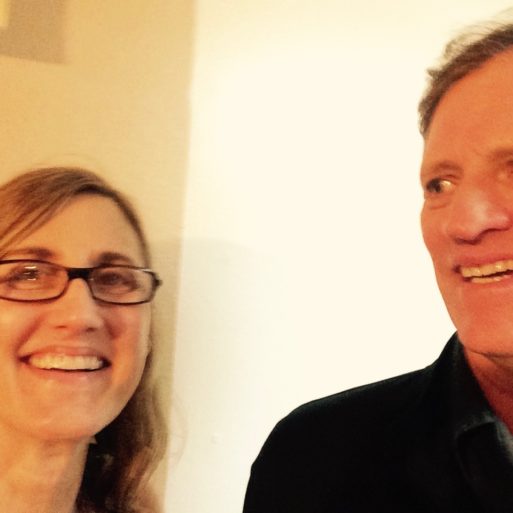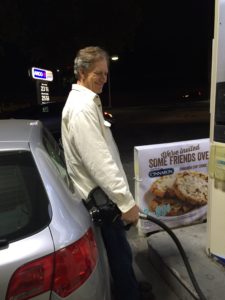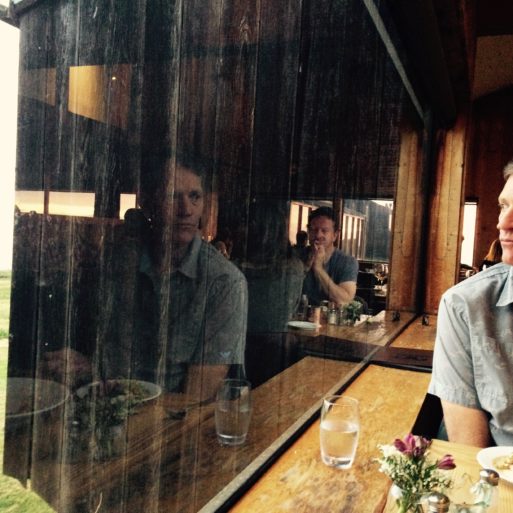This is Suzette’s story as told by Melissa Gouty. Our “Opening Our Hearts” stories are based on people’s real-life experiences. By sharing these experiences publicly, we hope to help our readers feel less alone in their grief and, ultimately, to aid them in their healing process. In this article, we tell the story of a man who accidentally killed his son and how it impacted his life.
I think about it now as a huge boulder dropped into the middle of a mirror-flat lake.
Once the boulder falls into the water, ripples appear from the center outward. Huge concentric circles travel over the surface in a repeating pattern all the way to the shore. Those ripples continue out for a long time.
Tragedy is like the dropping of a huge boulder. It crashes into a life and disturbs it for years. Once it happens, wave after wave of cosmic disturbances push out, sending smaller tsunamis of grief out over a widespread area.
I was a victim of this ripple effect of grief. Even though I work every day helping people deal with end-of-life issues, I was somehow unprepared for the devastation it could cause.
My knowledge of death, dying, and mourning did not make it any easier when I lost someone I loved to his own sorrow.
As I held him in my arms, Larry confided, “I accidentally killed my son.”
I was at a point in my life when I was ready for a partner. I had dated off and on for a decade, but something changed when I met Larry. When we met for our first date in a restaurant, there was a spark. I knew as soon as he slid into his seat that there was something special about him. I couldn’t stop smiling.
The spark quickly ignited an intense fire.
It was like a symbiosis. We were so in tune with each other. We had so much fun going to restaurants and cooking together. Even our bodies fit well together. He was 6’4″ and I’m 6’0,” so every step was effortless. Every movement was in sync. It was like we were physically made to complement each other.
I just knew that he was somebody special, THE ONE. We could talk about anything.
And talk we did. About our work, our opinions, our feelings, our histories. That’s when I learned about his past and the horrible, tragedy that had changed his life. As I held him in my arms, Larry confided, “I accidentally killed my son.”
Discussing tragedy was just one more way our souls communed. My job is helping people who are grieving, and I couldn’t help but be compassionate. I thought I could help him float his sorrow by sharing the load. I believed I could buoy him up by listening and understanding.
The loss of a child is one of the hardest kinds of grief imaginable. I knew that any parent who had a part in the death of his own child’s death would be scarred for life, no matter how accidental it was.
I should have seen the ripple effect of grief ebbing out from him then.
I attributed his separation from his wife to the tragedy they suffered without suspecting any other cause.
I knew his marriage had fallen apart, but I also knew that is not an uncommon thing when a child dies. I attributed his separation from his wife to the tragedy they suffered without suspecting any other cause.
The story began simply enough. Larry’s family always gathered at Bodega Bay around the Thanksgiving holiday. Before their arrival, they stopped at the grocery store to pick up food.
Getting groceries was different for Larry’s family than most. Larry’s 19-year-old son had an extreme dairy allergy — one that the family had dealt with for years. They understood checking labels, reading ingredient lists and exercising an abundance of caution.
But sometimes, even an abundance of caution is not enough.
Larry thought he picked up a non-dairy pumpkin pie.
When the family arrived at their lodgings, they loaded the food into the refrigerator. It wasn’t until the last day of their vacation that Larry sliced that pie.
I never thought that something as simple as pumpkin pie could be an instrument of death.
Apparently, Larry had picked up the wrong pie. A bite or two, and his son went into instant anaphylactic shock.
In the panic, no one could get anywhere fast.
Circumstances conspired against them. The family was on vacation, and keys were strewn in odd places. Multiple cars were crammed into the driveway from multiple children and multiple significant others. In the panic, no one could get anywhere fast. So they called the local volunteer fire and rescue, but they weren’t trained to deal with this kind of emergency.
Larry’s 19-year-old son was dead on arrival at the hospital.
I can’t imagine having accidentally killed your own child.
Larry and I met five years after this happened. But five years is not really a very long time after such a life-changing event.
And I didn’t realize that Larry’s grief was untreated and unresolved. I didn’t know that the ripples of his grief were beginning to slap against me.
I was so happy. He was good-looking and fun, and it felt like we were connected. We decided to live together in my house. Everything seemed to be going along just fine. Then the anniversary of his son’s death came around.
To keep his mind off of it, I suggested Larry cook some meat for dinner while I was gone to work. Later that night, I realized that he had used a sharp knife on the brand-new cooktop. He had so violently attacked the meat that there were scratches and nicks all over what had been a pristine surface at the beginning of the day.
There were also times when he was withdrawn. Sometimes he didn’t even seem to know I was there. I thought maybe he needed a lot of quiet time alone. I wondered if he was depressed, but I put all my doubts down to the fact that we were getting used to living together 24 hours a day.
This went on for five months. I was content and happy — until the day I found out. My world was shattered.
One morning, Larry came into my office to tell me good-bye before he left for work. I was glad to see him before he left and gave him a big kiss. Because it felt good to kiss the man I loved, I wrapped my arms around him and kissed him again.
This just wasn’t right, so I immediately searched the web for my weird, sudden symptoms.
As he walked out the door, my tongue started buzzing. My mouth tasted like a chemical. It was numb. My tongue was freezing all the way to the back of my throat.
I knew something was wrong. This just wasn’t right, so I immediately searched the web for my weird, sudden symptoms.
What I found out devastated me.
Larry was using cocaine.
I was totally blindsided. I hadn’t seen any signs. I didn’t know that he had been lying to me the whole time we were together.
When he got home that night, he was peppy and cheerful, talking non-stop, asking about my day.
I thought, “Oh my God. He’s all coked up!”
Larry didn’t deny it. In the aftermath of the grief of his son’s death, he tried to escape his pain with drugs. He’d been using cocaine for a long time.
Drug use was bad enough. Dishonesty was even worse.
It was the deceit. His capacity for lying. The not knowing what was true that did me in.
Larry left my house that night, our relationship destroyed by the aftermath of untreated grief. I still mourn the loss of the man I loved, feeling the ripple effect of his grief five years later.
I see now that nobody talks about people killing other people accidentally. It’s a tragedy too painful for most people to acknowledge, though I could not have been more compassionate. I also see now that Larry didn’t participate in any kind of healing strategy. He wouldn’t watch any movies that dealt with grief. He wouldn’t read a single book on the topic. No grief counseling.
Larry’s story is one of tragedy and his inability to go on without drugs.
My story is one of love lost to the ripple effect of grief. Love drowned by the ongoing currents that radiated from Larry, five years after the tragedy that destroyed him.

 The Ripple Effect of Grief
The Ripple Effect of Grief






 First the Wealth Gap, Now the U.S. Has a Growing Health Gap
First the Wealth Gap, Now the U.S. Has a Growing Health Gap
 How to Comfort A Dying Loved One
How to Comfort A Dying Loved One
 Our Annual Seven Holiday Gifts for Someone Who Is Grieving, 2024 Edition
Our Annual Seven Holiday Gifts for Someone Who Is Grieving, 2024 Edition














